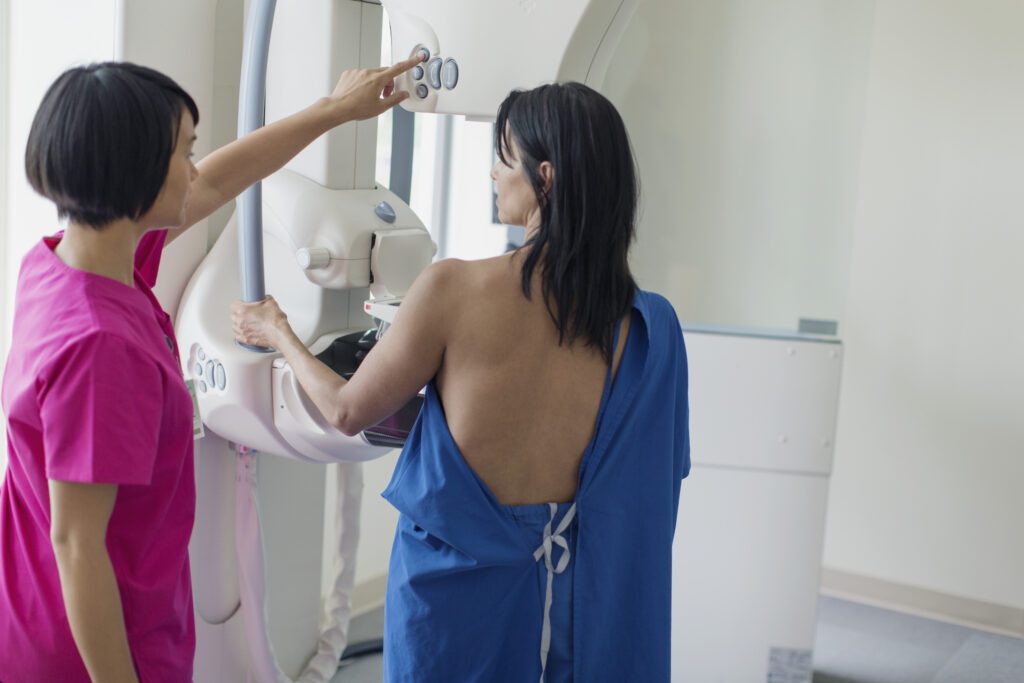Mammograms are a fact of life for the majority of women as The American College of Radiology recommends annual screening mammograms for all women older than 40 as a necessary breast cancer screening. Despite the necessity of mammograms, there is a lot of incorrect information circulating about them. Get the facts by taking our quiz on the myths surrounding mammograms and learn why this medical screening is so important.
1. Myth or fact? If you don’t have any symptoms of breast cancer or a family history, then you don’t need to worry about getting an annual mammogram.
A. Myth. It’s best to catch breast cancer early, and waiting until symptoms appear can mean the cancer is more advanced.
B. Myth. More than 75 percent of women who have breast cancer have no family history.
C. Fact. You can only get breast cancer if you have a family history of it.
D. None of the above
2. Myth or fact? A mammogram will expose you to an unsafe level of radiation and can cause cancer.
A. Myth. Mammograms don’t use radiation.
B. Myth. Mammograms utilize very small doses of radiation—it’s like getting an X-ray.
C. Fact. Mammograms utilize a high level of radiation.
D. None of the above
3. Myth or fact? Mammograms are inaccurate and thus a waste of time.
A. Myth. Although they are not perfect, mammograms are the best tool available in early detection.
B. Myth. When cancer is present, mammograms are about 80% effective in identifying it.
C. Fact. You shouldn’t waste your time on inaccurate tests.
D. Fact. Mammograms are the only test that aren’t 100% effective.
4. Myth or fact? A screening mammogram is not guaranteed to find every type and instance of cancer in breast tissue.
A. Myth. Mammograms detect all types of cancer.
B. Myth. Mammograms detect every instance of cancer.
C. Fact. Normal breast tissue can both hide cancer and mimic cancer.
D. Fact. Dense breast tissue makes it harder to detect cancer.
5. Myth or fact? If you had a normal mammogram last year, you don’t need another one this year.
A. Myth. Having a normal mammogram does not guarantee that future mammograms will be normal.
B. Myth. Having a mammogram every year increases the chance of detecting cancer when it is small and when it is most easily treated.
C. Fact. A normal mammogram is good for five years.
D. Fact. A normal mammogram is good for 10 years.
6. Myth or fact? Mammograms are painful.
A. Myth. Everyone has a different pain tolerance level.
B. Myth. The compression involved in a mammogram is more often described as temporary discomfort.
C. Fact. Mammograms were designed to be painful.
D. None of the above
7. Myth or fact? You don’t need a mammogram if your doctor didn’t schedule one for you.
A. Myth. Getting a mammogram yearly is recommended by medical professionals for every woman over the age of 40.
B. Myth. You can ask to have a mammogram even if your doctor forgets to request one for you.
C. Fact. You don’t need it if your doctor forgot to request one for you.
D. Fact. You can’t get a mammogram if your doctor didn’t schedule one for you.
compiled by ERIKA ALDRICH / Resources: Information provided by John Hopkins Medicine and the US Food and Drug Administration.
ANSWERS:
- A. and B. Myths. You can get breast cancer even without a family history, and mammograms can detect cancer in the early and most treatable stages.
- B. Myth. Mammograms utilize very small doses of radiation. It’s like getting an X-ray. The amount of radiation used in a mammogram is minimal and does NOT cause cancer.
- A. and B. Myths. Mammograms are the best tool available in early detection, which increases survival rates, and they are about 80% effective in identifying cancer.
- C. and D. Facts. Both dense and normal breast tissue can hide or mimic cancer, making it so not every mammogram can detect cancer.
- A. and B. Myths. One normal mammogram does not mean the next will be normal. Yearly mammograms are the best way to detect breast cancer at its earliest stages.
- A. and B. Myths. While mammograms can be categorized as uncomfortable, most people do not categorize them as painful.
- A. and B. Myths. Even if your doctor forgets to request a mammogram for you, you still should get one every year, and you can also request a mammogram yourself.
